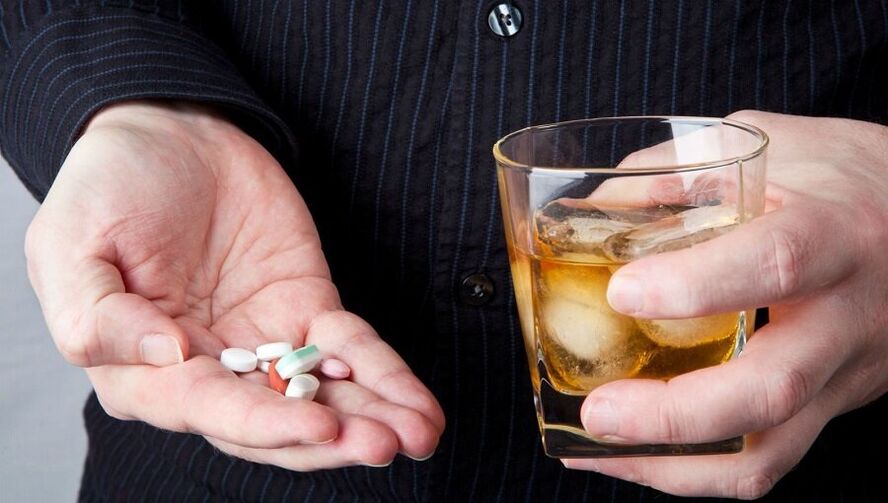Everyone knows that it is forbidden to combine alcohol and antibiotics, but few know when to drink alcohol after antibiotics. It is not clear how many days to expect after the last pill of the drug. Many wonder what happens if you miss a few glasses during or immediately after the treatment time. With these questions, we are trying to figure out what you need to first familiarize yourself with the effects of alcohol and antibiotics on the body.

Treatment and contraindications to alcohol
In addition to being very effective drugs, antibiotics are also dangerous. It is imperative that your admission is coordinated with the attending physician. The main indicator of the need for their use is the presence of a bacterial infection, which the body cannot cope with on its own.
If a specialist has prescribed antibiotics, then during this treatment you should follow some rules:
- Strictly adhere to the timing and timing of taking the drug in order to maintain a constant concentration of certain substances in the blood.
- How long to take medication should be determined by the doctor. Usually the course does not last 2 weeks, and some drugs are enough for 3 days.
- It is recommended to drink the antibiotic with clean water without gas.
- Proper diet should be adhered to during treatment. From the diet you need to exclude fatty foods and, of course, alcohol consumption, even in small quantities.
The last rule should be given special attention, especially with regard to not drinking. In addition, it is forbidden to consume alcohol immediately and for a period of time after treatment. But why shouldn't alcohol be consumed after antibiotic treatment? When ethanol and its components get into the body, they break down into small elements and turn into simple compounds. And some of the molecules of the alcoholic drink begin to collapse with the molecules of drugs, which can lead to serious malfunction in the body.
It has been proven repeatedly that after taking alcohol, the effectiveness of antibacterial drugs is significantly reduced. In addition, such a mixture puts a heavy load on the liver, which adversely affects not only the work of this organ, but also the state of the entire body. Alcohol consumption after antibiotics or during treatment can lead to unpredictable reactions of systems and organs.
Possible consequences
As already mentioned, taking alcohol together or immediately after taking antibacterial drugs affects the entire body, not just individual areas, which is why the consequences are unpredictable. However, the most common are the following:
- If you drink alcohol while there are antibiotic substances in the body, a sharp form of allergy can occur.
- A great danger when drinking medication is exacerbation of poisoning and a hangover. The usual amount of drinking can then lead to a loss of control. At the same time, there is a risk of mental deviation.
- Alcohol after taking antibiotics significantly reduces the medical effect of the latter, which may lead to the need to repeat treatment or increase the dose of drugs, which will also have an adverse effect on the body. In addition, increasing the dose of drugs helps to reduce their effect in the future and thus adapt the infection to the drug. Infection with the weakening of the antibiotic has time to get stronger and become resistant. Therefore, after an antibiotic regimen, the infection will recur over time and stronger medication will be required to clear it.
- Possible consequences are also traditional symptoms such as: headache, nausea, mental blurriness, liver damage and dizziness.
All of the above consequences can be avoided knowing when to take alcohol after an antibiotic.
What deadlines do you have to meet?
There is no precise indication of how long alcoholic beverages can be consumed after taking antibiotics. For each antibacterial drug, it is individually determined how many days after treatment you can drink alcohol, and this must be determined by the doctor. This period is usually at least 10 days. This is the minimum period during which a person's kidneys and liver will normalize and the intestinal flora will be restored. But these are general recommendations, it all depends on the characteristics of the organism.
If the patient has chronic kidney or liver disease, the time after which it is possible to drink alcohol is slightly longer. And in order to avoid mistakes, it is better to consult a specialist on the subject. The longer after the treatment that alcoholic beverages are not consumed, the better it will be for the body. After all, alcohol carries and therefore nothing useful for the body, and even more so in the period of its weakening.
Today, the main contraindications to whether alcohol can be consumed during antibiotic treatment, as well as general alcohol abstinence terms that should be adhered to, have been examined.
If you follow these recommendations and rules, it will turn out that not only will the disease be quickly eliminated with the help of antibiotics, but also the body will not be harmed. But it is important to remember that drinking antibiotics without a doctor's prescription is also prohibited.


























